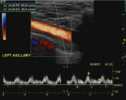Good documentation is the key to optimal coding and reimbursement for radiology procedures. By including all of the essential elements in the radiology report, physicians give their coders all of the information they need to get the billing done most efficiently. But when the report lacks some required piece of data, the coders must contact the radiologist for clarification. At best, this slows down the billing process but, at worst, it leads to under-coding and therefore lower payment than is possible for the procedure.
Duplex Doppler Ultrasound Tips to Help Maximize Radiology Reimbursements on February 26, 2015
Categories: radiology reimbursement, radiology documentation
An Overview of the Medicare Quality Reporting Provisions Affecting Radiology Practice Reimbursements on February 24, 2015
The stage is set for a new era of Medicare payment modification using data self-reported by physicians that measures the quality of their work. The two programs already in place are the Physician Quality Reporting System (PQRS) and the Value-Based Payment Modifier (VM). These two will work in concert to determine either a positive, neutral or negative payment adjustment to the basic Medicare fee schedule, generally two years following the reporting year. Note that the rewards and penalties for these programs are cumulative; failure to meet the PQRS reporting requirements will invoke a penalty under both the PQRS and the VM programs.
Categories: radiology reimbursement, value modifier, PQRS
Hidden Reductions in the Medicare 2015 Physician Fee Schedule on January 2, 2015
According to the American College of Radiology (ACR), “The technical component for more than 200 imaging procedures will be cut by up to 55 percent in the final 2015 Medicare Physician Fee Schedule (MPFS) because of a decision to remove the direct practice expense of numerous film inputs that affected their reimbursement rates in favor of the cost of acquiring a desktop computer.” The decreased reimbursement is sizable for such procedures as myelography, CTA and a variety of ultrasound studies. The ACR’s analysis was released in their recent eNews article Analog to Digital Conversion to Cost Radiologists. The article includes helpful impact tables showing the specific change in radiology reimbursement rates between 2014 and 2015 for each CPT code.
The changes cited by the ACR are the result of Medicare’s attempt to recognize that most practices today use digital PACS technology rather than film. They removed the costs associated with film production and storage, but replaced those costs with only the value of $2,501 to represent a typical radiology reading station. No recognition was given to the overall cost of installing and maintaining the central PACS hardware and software. The ACR reports that, as an example, CPT 76377 (3D Post-processing of tomographic modality) receives a 45.7% reduction for film-based costs offset by a gain of only 1.7% when the desktop computer is substituted.
Categories: radiology reimbursement, radiology coding, medicare reimbursement, MPFS
The Impact of Coding Changes on Radiology Practices in 2015 on December 23, 2014
Radiologists concerned with maximizing practice revenue in 2015 would do well to understand the nuances of new coding changes that can impact reimbursements. The majority of coding changes for 2015 involve either bundling two codes into one when those codes are most often reported in combination or the creation of new codes to clarify their usage. The resulting impact on an individual practice’s overall payment levels should be minimal but will depend on its actual procedure mix. One major item of note is that Medicare will begin to provide reimbursement for Digital Breast Tomosynthesis (DBT, sometimes referred to as 3D Mammography) beginning in 2015 in the form of a code to be added-on to digital screening and diagnostic mammography services, although reimbursement from commercial payers is not guaranteed.
Categories: radiology reimbursement, radiology coding
How to Document y-90 Radioembolization Cases to Maximize Reimbursement on October 17, 2014
Click here to read our October 2020
y-90 radioembolization article
Interventional Radiology Meets Radiation Oncology – The y-90 Story
When a physician is performing an interventional procedure valued in the range of $4,000 – $6,000 for the professional component, attention to thorough and accurate documentation is a requirement for maximal reimbursement. Each case presents its own individual set of circumstances and a well-constructed operative report will tell the story of the case step-by-step. Each artery or branch into which a catheter is placed for diagnostic imaging or intervention is assigned a separate CPT code, and so the operative report must describe with specificity each catheter placement. When these descriptions are in a logical, sequential order, certified coders say that this allows them to better understand every aspect of the case so they can then accurately identify and apply up to 45 CPT codes to maximize reimbursement for it. A descriptive evaluation of each artery supports payment of the codes that are submitted for reimbursement.
Categories: radiology reimbursement, radiology billing, physician reimbursement, radioembolization, interventional radiology, nuclear medicine, y-90
How New MPPR Rules Affect Your Radiology Practice Revenue on September 24, 2014
As private insurance payers begin adopting the Multiple Procedure Payment Reduction (MPPR) methodology that was implemented by Medicare several years ago, practices that are not ready could face a revenue loss of 25% or more for some services. Of specific interest to radiologists is United Healthcare, which announced in its May 2014 Network Bulletin that it would be expanding its MPPR to the professional component of imaging services in alignment with Medicare’s policy. This change will apply to United Healthcare’s Commercial and Community Plan. Originally the policy was to take effect in the third quarter of 2014 but under pressure from radiology advocacy organizations, United has now reported that implementation of the policy will be delayed until the fourth quarter of 2014. This brief reprieve provides radiology practices with an opportunity to lessen this detrimental impact on their revenue by improving their current processing methodologies before these changes take place.
Categories: radiology reimbursement, physician reimbursement, radiology coding, revenue cycle management
Participate in CMS Quality Programs Now, Avoid Medicare Reimbursement Penalties Later on June 11, 2014
Physicians’ Medicare reimbursement in the coming years will be impacted by their participation in CMS quality programs in 2014. Quality reporting programs such as PQRS, Meaningful Use and the new Value-Based Modification Program have allowed physicians to earn incentives for compliance with their requirements, but beginning in 2015 that carrot will become a stick. Medicare will apply penalties that reduce reimbursement for physicians that are eligible but do not participate in the programs. Payment reductions for 2015 have already been determined by participation in 2013, but there’s still an opportunity to take steps in 2014 to avoid a reduction in 2016 payments.
Categories: radiology reimbursement, physician reimbursement, regulatory, medicare reimbursement, medical billing
SGR Delay Averts 2014 Medicare Physician Reimbursement Cut on April 4, 2014
On April 1st, President Obama signed into law the Protecting Access to Medicare Act of 2014 that delays for 12 months a permanent repeal of the SGR and averts a 24% Medicare physician pay cut that was scheduled to begin April 1st. The bill also extends the 0.5% provider update until March 31st, 2015. Somewhat unexpectedly, the bill also delays ICD-10 implementation until at least October 1, 2015.
Categories: radiology reimbursement, physician reimbursement, medicare reimbursement
Evaluating the Impact of the 2014 MPFS on Radiology Reimbursement on January 31, 2014
When the dust finally settled, we could see how the 2014 Medicare Physician Fee Schedule (MPFS) would impact radiology reimbursement, and results were mixed. Hospital-based services came out ahead while imaging centers generally took a big hit. Due to the many factors that contribute to the calculation of the final fee schedule, a weighted analysis will help you determine the actual impact on your practice.
Categories: radiology reimbursement, radiology billing, regulatory, medicare reimbursement
Radiology and Radiation Oncology: Regulatory Changes for 2014 on December 27, 2013
The Medicare Physician Fee Schedule (MPFS) contains lower reimbursement in 2014 for diagnostic imaging and interventional radiology due to revisions adopted by the Centers for Medicare and Medicaid Services (CMS) in the annual Medicare rules update published in December. Radiation oncology practices will see a slight increase in the fee schedule while freestanding radiation therapy centers are facing considerable reductions. Meanwhile, Congress took some action to defer even larger cuts but continues to leave the medical community uncertain of future payment rates for physician services.
Categories: radiology reimbursement, radiology billing, medicare, radiation oncology reimbursement













